Potrebujeme váš súhlas na využitie jednotlivých dát, aby sa vám okrem iného mohli ukazovať informácie týkajúce sa vašich záujmov. Súhlas udelíte kliknutím na tlačidlo „OK“.
ASTM D5099-08(2013)
Standard Test Methods for Rubber—Measurement of Processing Properties Using Capillary Rheometry
Automaticky preložený názov:
Štandardné skúšobné metódy pre Guma & ndash; Meranie vlastností spracovanie pomocou kapilárnych reometre
NORMA vydaná dňa 1.11.2013
Informácie o norme:
Označenie normy: ASTM D5099-08(2013)
Poznámka: NEPLATNÁ
Dátum vydania normy: 1.11.2013
Kód tovaru: NS-29832
Počet strán: 9
Približná hmotnosť: 27 g (0.06 libier)
Krajina: Americká technická norma
Kategória: Technické normy ASTM
Kategórie - podobné normy:
Anotácia textu normy ASTM D5099-08(2013) :
Keywords:
capillary rheometer, flow properties, piston, processing properties, screw extrusion, shear rate, shear stress, viscosity, ICS Number Code 83.060 (Rubber)
Doplňujúce informácie
| Significance and Use | ||||||||||||||
|
4.1 These test methods are useful for characterization of raw, or compounded, unvulcanized rubber in terms of viscosity, or resistance to flow. 4.2 The data produced by these test methods have been found useful for both quality control tests and compound development. However, direct correlation with factory conditions is not implied. 4.3 Flow performance data permits quality control of incoming raw rubbers because the flow parameters are sensitive to molecular weight and to molecular weight distribution. Therefore, these test methods may distinguish differences between lots. 4.4 The shear viscosity or flow viscosity of compounded rubber batches in the raw (unvulcanized) state will not only be sensitive to the raw polymer molecular properties, but will also be affected by type and amount of filler, plasticizer or softener levels, amount and type of copolymer blend, and other compounding materials. These test methods can serve as a quality control tool for either incoming custom mixed compounds or for in-house quality assurance checks on production mixing. These test methods are useful for research and development of new products by measuring the rheological effect on a rubber compound of new polymers, resins, softeners, etc. |
||||||||||||||
| 1. Scope | ||||||||||||||
|
1.1 These test methods describe how capillary rheometry may be used to measure the rheological characteristics of rubber (raw or compounded). Two methods are addressed: Method A—using a piston type capillary rheometer, and Method B—using a screw extrusion type capillary rheometer. The two methods have important differences, as outlined in 7 – 10 and 11 – 14, respectively. 1.2 These test methods cover the use of a capillary rheometer for the measurement of the flow properties of thermoplastic elastomers, unvulcanized rubber, and rubber compounds. These material properties are related to factory processing. 1.3 Since piston type capillary rheometers impart only a small amount of shearing energy to the sample, these measurements directly relate to the state of the compound at the time of sampling. Piston type capillary rheometer measurements will usually differ from measurements with a screw extrusion type rheometer, which imparts shearing energy just before the rheological measurement. 1.4 Capillary rheometer measurements for plastics are described in Test Method D3835. 1.5 The values stated in SI units are to be regarded as standard. The values given in parentheses are for information only. 1.6 This standard does not purport to address all of the safety concerns, if any, associated with its use. It is the responsibility of the user of this standard to establish appropriate safety and health practices and determine the applicability of regulatory limitations prior to use. |
||||||||||||||
| 2. Referenced Documents | ||||||||||||||
|
Podobné normy:
Historická
1.5.2009
Historická
1.5.2009
Historická
1.5.2009
Historická
1.6.2010
Historická
1.5.2010
Historická
1.5.2011
Odporúčame:
Aktualizácia technických noriem
Chcete mať istotu, že používate len platné technické normy?
Ponúkame Vám riešenie, ktoré Vám zaistí mesačný prehľad o aktuálnosti noriem, ktoré používate.
Chcete vedieť viac informácií ? Pozrite sa na túto stránku.


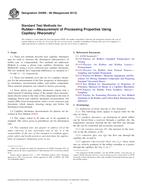
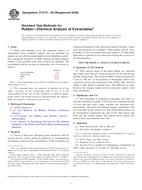 ASTM D5774-95(2009)..
ASTM D5774-95(2009)..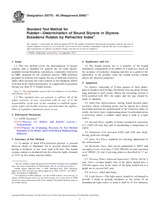 ASTM D5775-95(2009)e..
ASTM D5775-95(2009)e..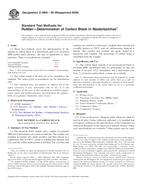 ASTM D5805-00(2009)..
ASTM D5805-00(2009)..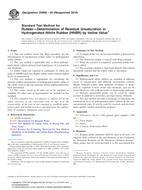 ASTM D5902-05(2010)..
ASTM D5902-05(2010)..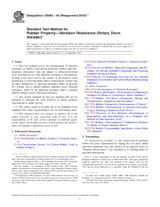 ASTM D5963-04(2010)e..
ASTM D5963-04(2010)e..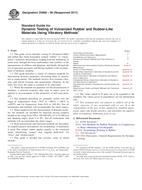 ASTM D5992-96(2011)..
ASTM D5992-96(2011)..
 Cookies
Cookies
